Bridging the Digital Gender Gap in Sri Lanka: Challenges and Opportunities for Women in STEM
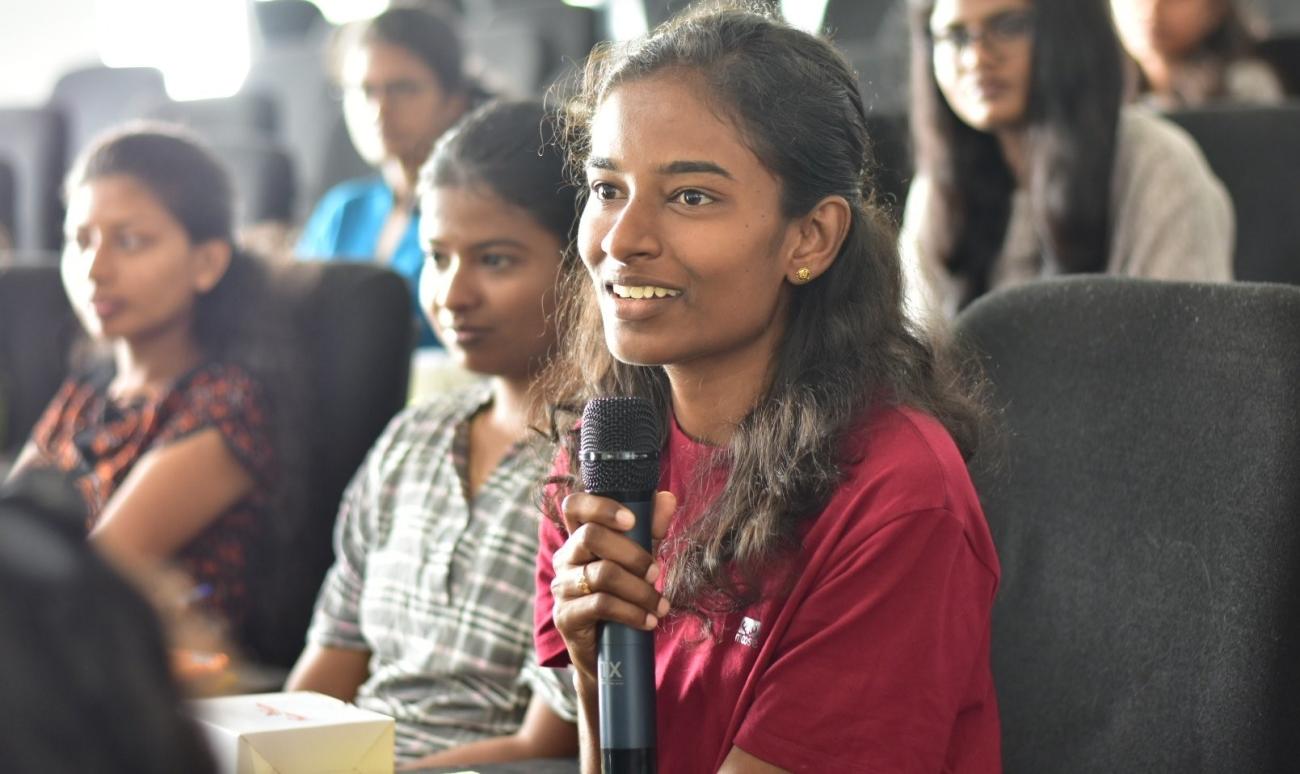
Celebrating International Women’s Day 2022
This year, the United Nations observes International Women’s Day by celebrating the women and girls leading innovation on transformative technology and digital education. Under the theme ‘DigitALL: Innovation and technology for gender equality’, the United Nations aims to generate a discussion on how to make digital spaces and tools more accessible for women and girls.
As one of the transformative forces currently shaping society, digitalization has the potential to generate extraordinary advances for the socio-economic development of women and girls. However, it also poses the risk of perpetuating existing gender disparities. Despite recent improvements, global studies suggest that there is a persisting gender gap in the technology and innovation sectors across many countries, as women and girls are continuously underrepresented in science, technology, engineering, and mathematics (STEM) – holding only 2 in every 10 jobs within several of these industries.
In Sri Lanka, women have been predominantly engaged in informal employment and, are as a cohort, overrepresented in elementary and clerical occupations compared to men. The COVID-19 pandemic served as one example of how accelerated digitalization of jobs and increasingly common home-based working arrangements disproportionately affect women. Prior to the pandemic, the International Labor Organization (ILO) highlighted poor technological knowledge as a barrier to women’s ability to work from home, thus revealing the consequences that may arise when women and girls are left behind in an era of rapid digitalization.
Women that do have access to digital spaces are able to work remotely and flexibly, and are therefore better positioned to circumvent mobility and cultural barriers, enter the workforce and generate an income. However, digital spaces can also expose women and girls to online harassment and abuse. In fact, violence facilitated by digital technologies tends to disproportionately target women, who suffer serious consequences as a result.
The Sri Lankan women blazing trails in technology, innovation and engineering
Amira Ghaffoor, CEO of Northwood Consulting, and recipient of the award ‘Emerging Women Tech Entrepreneur of the Year’ in 2021, highlights the specific challenges that women face in the technology sector in Sri Lanka. ‘Being a woman in this industry poses its own share of roadblocks. Although the corporate culture of Sri Lanka is not overtly biased, covert biases can lead to a challenging work environment. These biases often show up in the form of less confidence in women-led startups’, explains Ms. Ghaffoor.
Being a woman in this industry poses its own share of roadblocks. Although the corporate culture of Sri Lanka is not overtly biased, covert biases can lead to a challenging working environment. These biases often show up in the form of less confidence in women-led startups - Amira Ghaffoor, CEO of Northwood Consulting
According to Zahra Marzook, Electrical Engineer the Ceylon Electricity Board, women engineers tend to face similar challenges in the workplace. ‘I have a clear memory of another engineer at the power plant telling me that "there is no work for women here”. Upon my return to work after maternity leave, I faced hesitancy from managers to assign me work I had previously done. There was a widespread belief that fieldwork was unsuitable for women or that we were not capable of it, resulting in the allocation of more office work to female employees. Initially, there was a clear bias towards male employees when it came to allocating instruments or assigning staff. Male employees were often given priority over female employees’, describes Ms. Marzook.
In January 2020, Ms. Marzook was awarded the IET Young Woman Engineer Award, an achievement she describes as a ‘defining moment’ in her career as an engineer. ‘It not only validated my hard work and accomplishments but also inspired me to be an advocate for gender equality and diversity in the field. The recognition served as a powerful message to other women in the industry that they too can achieve great things with their skills and knowledge’, says Ms. Marzook.
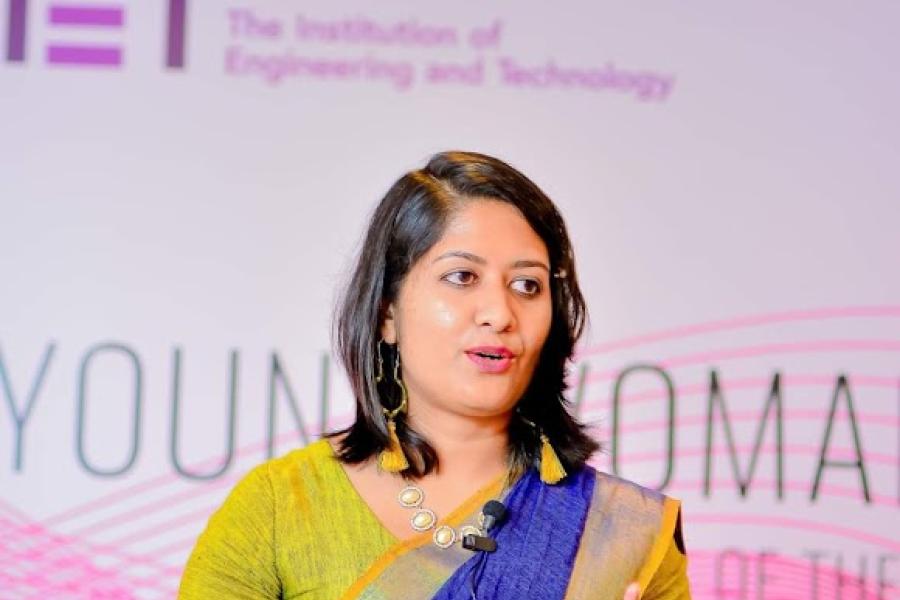
‘As a result of winning the award, I found myself in a unique position to share my experiences and knowledge with other women in the industry, and I took this responsibility seriously. I made a conscious effort to speak up more, participate in events and activities related to promoting STEM subjects, and mentor young women aspiring to pursue careers in engineering. In addition to the personal impact it had on me, the award had a ripple effect in my community. I received numerous messages from women who felt inspired by my achievement and felt empowered to pursue their passions in engineering or other fields. It was a clear message that with dedication and hard work, anyone can achieve their goals, regardless of gender or any other factors’, Ms. Marzook continues.
Addressing the gender gap in STEM in Sri Lanka
Closing the gender gap in STEM requires targeted and continued efforts to combat harmful gender norms and stereotypes in institutions, operational frameworks of STEM fields, and society at large. Together with the EU in Sri Lanka, UN Women is working to create spaces for discussion on the existing challenges and opportunities to prepare students of all genders with the necessary soft skills to enter STEM fields, and works to challenge existing biases on the part of employers so that women in STEM have equal opportunities.
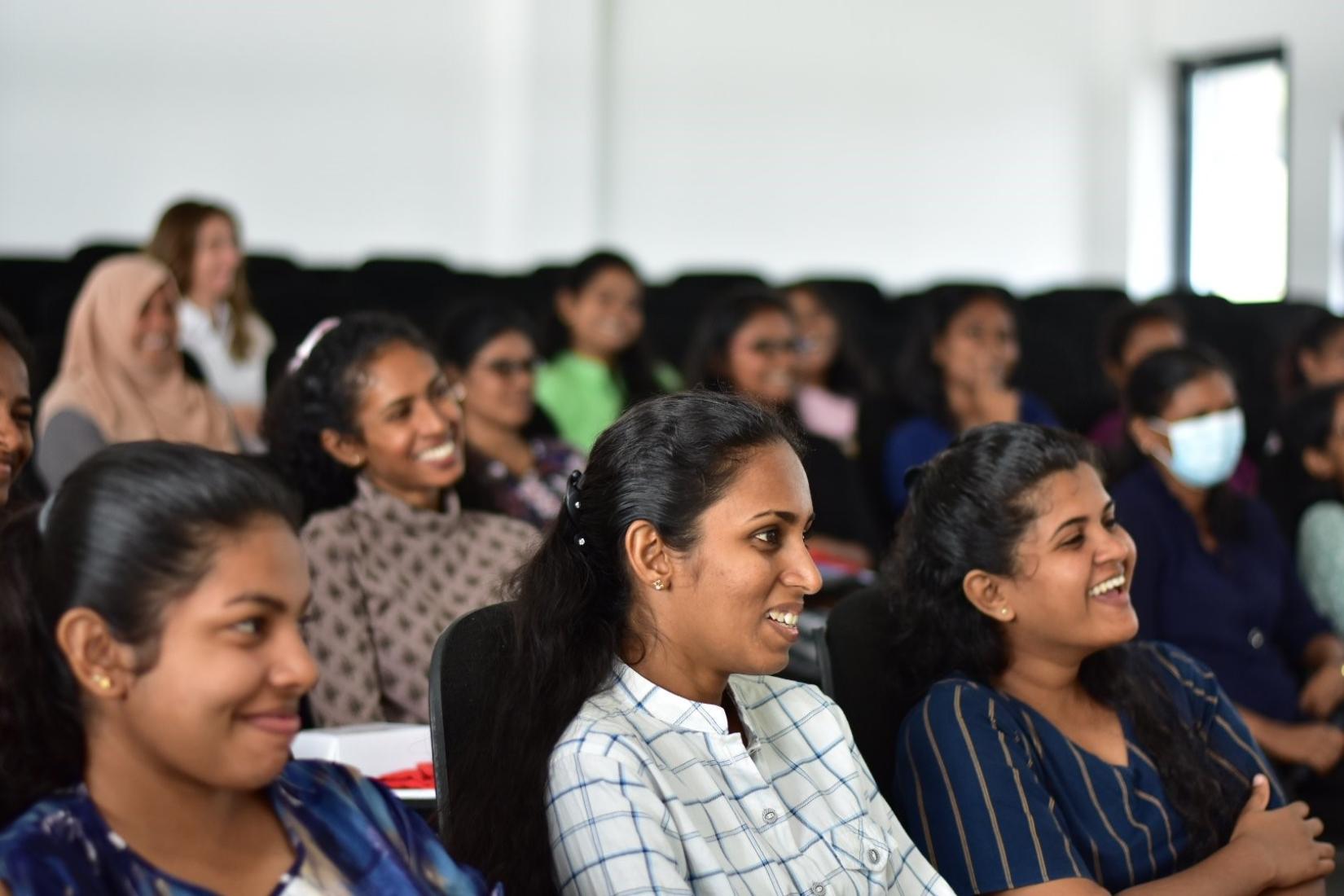
The United Nations in Sri Lanka has also contributed towards women and girls’ technological education through investment in skills development and lifelong learning. For instance, UNDP’s Memorandum of Understanding with Sri Lanka’s Vocational Training Authority has paved the way for the United Nations to provide learners and educators with digital skills and other opportunities to develop future-fit competences at an early age.
In 2014, UNDP also spearheaded Citra Social Innovation Lab, aimed at investing in innovative, agile and holistic solutions to development issues. As the Gender and Experimentation Lead at Citra, Deshani Senanayake ensures that gender equity is incorporated into all of the initiatives undertaken by the Lab and develops prototypes that are gender sensitive and inclusive.
‘Citra works towards building technical skills and capacities of young girls and women through various initiatives, as well as increase their exposure to the non-traditional sectors of tech and innovation. We focus primarily on young girls through the comprehensive HackaDev programme, which has its own Academy imparting ICT skills, along with other interventions which aim to equip young girls with capacities required to work in the spaces of innovation and entrepreneurship. The programme, through its various components, also works to connect young girls with mentors from within innovation and tech industries to expose them to opportunities and share experiences and valuable learnings’, explains Deshani Senanayake.
Recognizing the vital role of a strong and future-fit public sector in Sri Lanka, Citra also works with women government officers to build tech and innovation capacities through an initiative titled the NextGenGov Fellowship programme. ‘This experiential learning programme builds the capacities of government officers in the areas of innovation, human-centred design, design thinking, digital transformation, amongst others. Further, throughout the programme, we also bring together senior government officials, with a special focus on senior female officers, to share their experiences and encourage young female officers to experiment and innovate within their own offices and roles’, says Ms. Senanayake.
Advancing technological knowledge among women in agriculture
The agricultural sector is another area in which advancement of technological knowledge among women has had a transformative impact. 47-year-old Nishanthi Sri Nassanka is one of 21,000 farmers trained in Good Agricultural Practices (GAP) for better production and a better environment, with support from the Food and Agriculture Organization of the United Nations (FAO). Based in the small town of Adhikarigama in the Kandy district, Ms. Sri Nissanka has been farming for close to 19 years, using traditional farming practices for vegetables such as green chili, bitter gourd, and long beans, and relying on only one season a year for a sufficient yield.
As a participant in the training, Ms. Sri Nassanka was able to invest in a complete agriculture training package and utilized sustainable agriculture practices to reduce her operational costs, cultivate three to four times a year instead of just once, and increase her annual yield. ‘There are many ways that FAO has helped’, she relates. The training delivered technical knowledge including contemporary farming methods, such as the correct use of polythene and fertilizer by way of an efficient delivery system. ‘Because of this, I have a bigger yield, and less of the crop gets destroyed by pests and diseases.’ This practice is also more environmentally friendly, as it mitigates the erosion of soil.
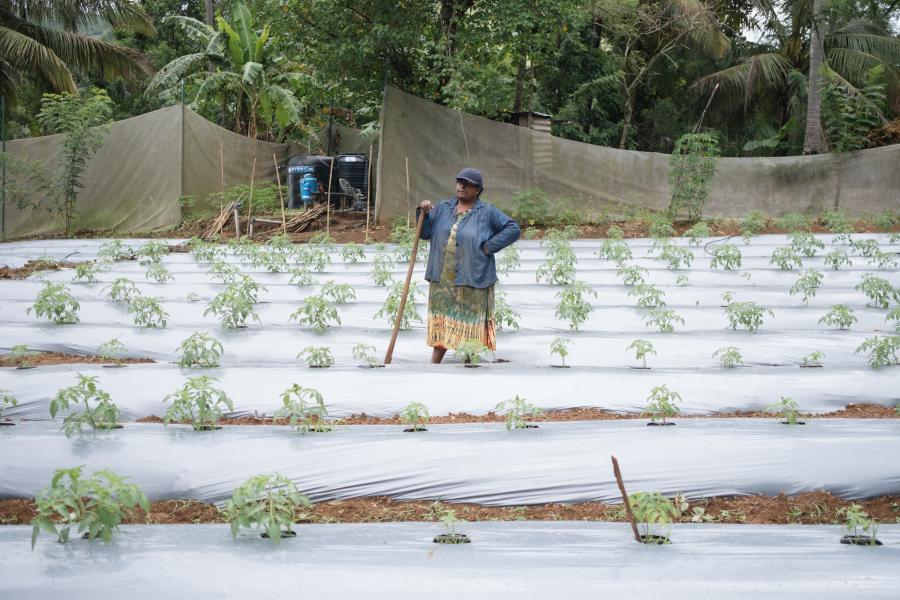
Ms. Sri Nassanka quickly adapted to the efficient use of water and irrigation techniques that were implemented by FAO, which were major obstacles in her previous farming methods. She notes that the land is now easier to manage, and that she is able to produce more, and directly sell to vendors over the course of the year, ensuring a profitable return. ‘I am satisfied that I can produce my own food during these shortages. Thanks to these practices I am not as dependent on fertilizer as I used to be, which was a relief during this time. My family is also happy to help me on the field when I need the extra help,’ she says, beaming with pride over being able to pass on these sustainable practices to the next generation.
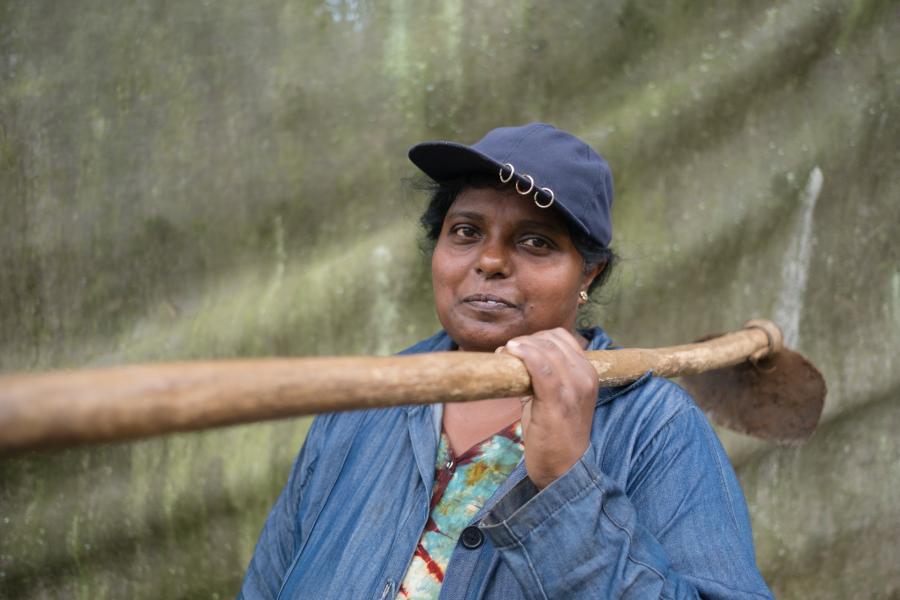
‘I am very happy that my children can see us being independent’, she says. As both the production and distribution processes have become increasingly streamlined through digitalization, Ms. Sri Nassanka notes that there are many indirect benefits, such as being introduced to online banking services and communication applications such as WhatsApp, which have enhanced her business. Going forward, Ms. Sri Nassanka hopes to expand her farming activities in other areas. “Being self-sufficient is the only way we can come out of this crisis together,’ she asserts.
I am very happy that my children can see us being independent. Being self-sufficient is the only way we can come out of this crisis together - Nishanthi Sri Nassanka, one of 21,000 farmers trained in Good Agricultural Practices (GAP)
Unlocking untapped potential by empowering women in technology
As UN Women’s Gender Snapshot 2022 Report indicates, low- and middle-income countries have omitted USD 1 trillion in the last decade alone by women’s limited access to digital tools and spaces. As such, bringing women and other marginalized groups into technology and innovation allows for untapped potential across a wide variety of sectors to be unlocked. This also poses great potential for innovation that meets the specific needs of these groups and that effectively promotes gender equality.
In light of International Women’s Day, the United Nations is bringing together Member States, UN entities and ECOSOC-accredited NGOs from all regions of the world for the sixty-seventh session of the Commission on the Status of Women (CSW67) to discuss innovation and technological change as a means to achieving gender equality and the empowerment of women and girls. CSW67 provides an opportunity to collectively address challenges and opportunities that arise as part of rapid digitalization and transformative technology shaping socio-economic development and prospects of achieving the 2023 Agenda.
Looking to the future, Deshani Senanayake identifies key areas of improvement for achieving gender equity in these sectors in Sri Lanka. ‘I believe Sri Lanka is making progress in working towards gender equity within the sectors of innovation and tech, especially within the private sector and the ICT industry. There is priority and focus provided within these sectors to build capacities and increase opportunities for young women. However, there is still a gap within the larger context of Sri Lanka due to the prevailing issues of limited accessibility, both to skill enhancement and opportunities to enter the innovation and tech spaces, as well as limited exposure to the work already taking place in the country within these areas. Additionally, the cultural and social norms at play work to hinder young girls and women from entering these spaces, and instead keep them in more traditionally female-dominated sectors’, says Deshani Senanayake.
There is still a gender gap in Sri Lanka due to limited accessibility to skill enhancement and opportunities to enter the innovation and tech spaces, as well as limited exposure to the work already taking place in the country within these sectors - Deshani Senanayake, Gender and Experimentation Lead at Citra Social Innovation Lab
For young tech entrepreneurs starting out in their professional career, Amira Ghaffoor encourages them to remain confident, disciplined and focused on their goals. ‘Not every start is going to work, but every startup is worth a try. If you have confidence that the product or service you are offering can scale, go ahead and do it’, says Ms. Ghaffoor.

‘Create a disciplined life for yourself and remember that discipline is the foremost thing that will take you anywhere. Build a team that is as passionate as you and look for the right attitude when hiring others. Stay focused, and don’t be swayed by what you see on social media. Be open-minded and open to criticism. Don’t try to perfect everything you are doing. Instead, try to sell it and improve on it as you go’, Ms. Ghaffoor advises.
As a female engineer, you bring unique perspectives and insights to the field. It is important to recognize your worth and value you bring and use your skills to contribute to society and the world - Zahra Marzook, Electrical Engineer the Ceylon Electricity Board and recipient of the 2020 IET Young Woman Engineer Award
Zahra Marzook offers similar advice to young women engineers, whom she encourages to ‘keep learning’, ‘build good relationships’, ‘give back to society, and ‘know your worth’. ‘As a female engineer, you bring unique perspectives and insights to the field. It is important to recognize your worth and value you bring and use your skills to contribute to society and the world’, says Ms. Marzook.




